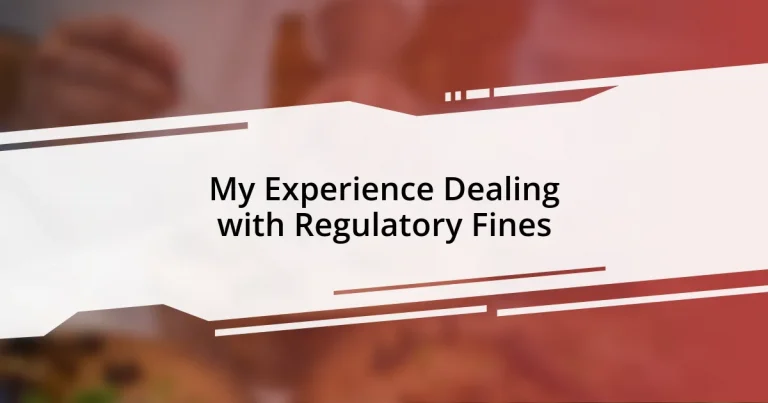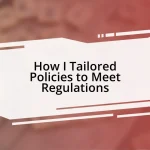Key takeaways:
- Regulatory fines stem from lack of awareness, insufficient documentation, and inadequate risk assessments, significantly impacting finances and morale.
- Proactive measures, such as regular training, compliance checklists, and open communication, are essential to prevent regulatory fines.
- Building positive relationships with regulatory authorities and learning from past mistakes can transform compliance challenges into growth opportunities.
- Creating a culture of vigilance and support within teams enhances compliance efforts and fosters innovation in addressing challenges.
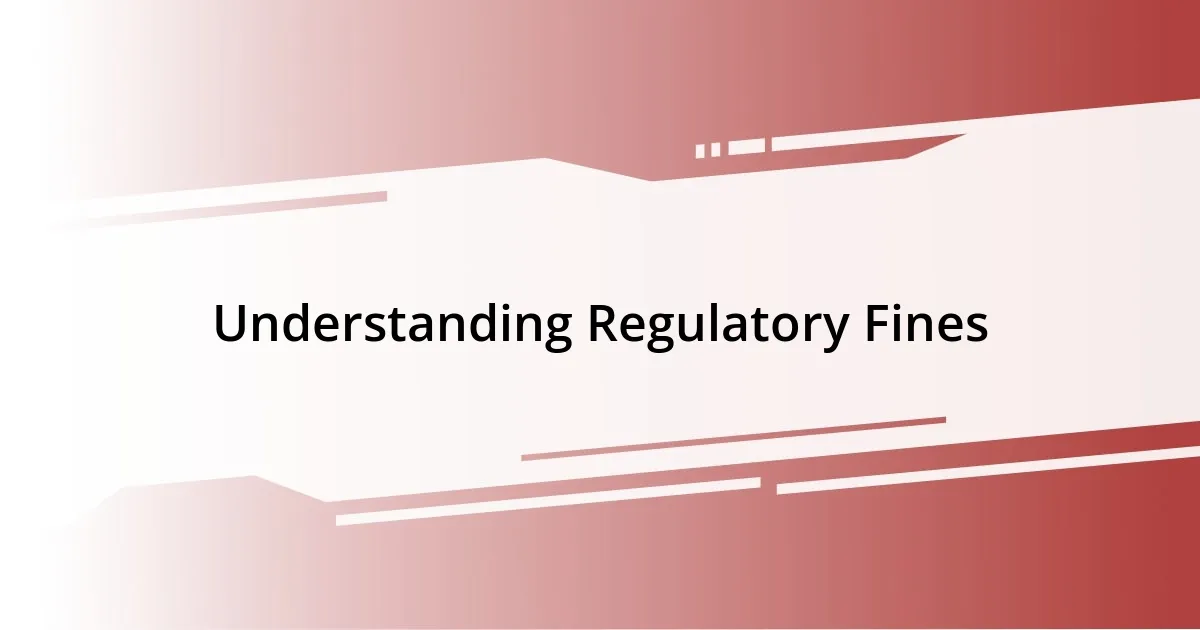
Understanding Regulatory Fines
When I first encountered regulatory fines, it was a jarring experience. I remember feeling overwhelmed as I navigated a maze of rules and compliance measures, wondering how I could have missed the mark. These fines are often the result of unintentional oversights, but the impact is undeniably significant—both financially and emotionally.
Regulatory fines serve a crucial purpose: they encourage businesses to adhere to laws designed to protect consumers, the environment, and fair market practices. Have you ever considered how a single misstep can lead to a fine that not only threatens a company’s finances but can tarnish its reputation? The stress of knowing that a lapse on my part could lead to severe consequences motivated me to take compliance more seriously.
Understanding the intricacies of what leads to these fines can feel like an uphill battle. I recall a period when I was deeply engaged in a project, only to realize that certain practices had to align with industry regulations. The realization that a small detail had the potential to result in a hefty fine was a wake-up call for me. It’s a reminder that diligence and thoroughness aren’t just best practices; they’re essential lifelines in the ever-evolving landscape of regulation.
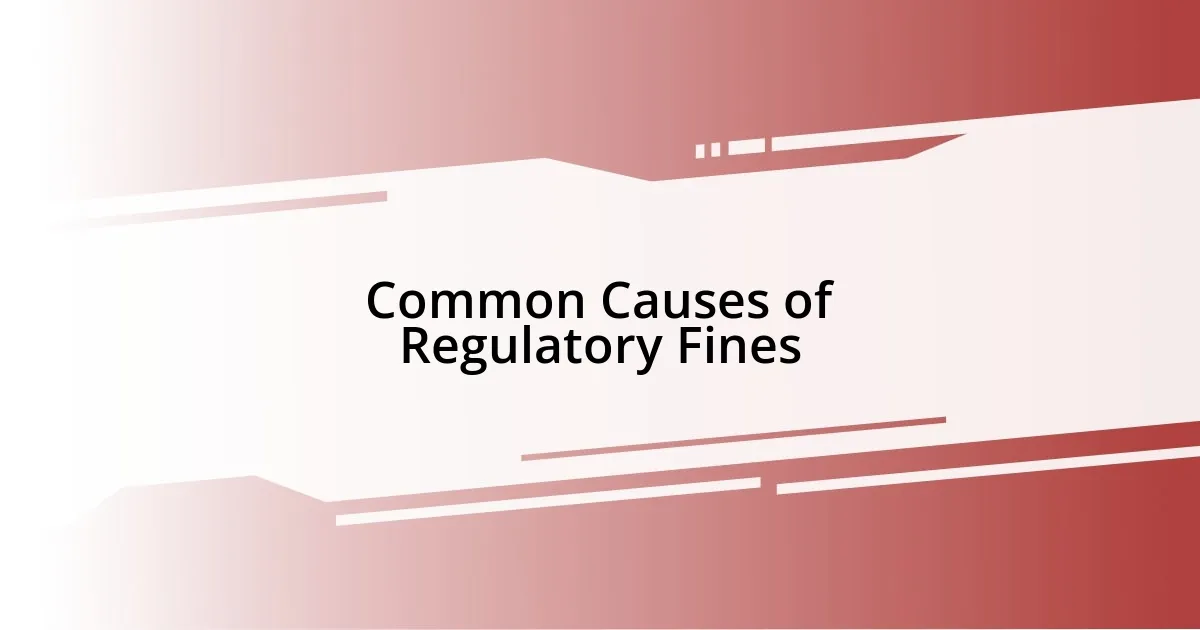
Common Causes of Regulatory Fines
It’s interesting to see how the common causes of regulatory fines can often stem from a lack of awareness. I distinctly recall an instance when my team failed to update our internal policies after a regulation change. It seemed like just an oversight at the time, but it resulted in a fine that shocked us all. Being out of sync with current regulations can hurt not just your finances but also your team’s morale and confidence.
Another frequent reason for these fines is insufficient documentation. Once, during an audit, I realized that our records weren’t as thorough as they needed to be. In that moment, I felt a wave of disbelief because I had always prided myself on being meticulous. This experience taught me that simply having processes in place is not enough; being able to prove compliance is equally critical.
Lastly, failure to conduct adequate risk assessments can lead to significant penalties. I once experienced this firsthand when a lack of risk analysis regarding certain operational practices opened us up to vulnerabilities. The fines that followed were a stark lesson in the importance of regular assessments. They serve as both a preventive measure and a way to ensure that I keep my organization compliant and protected against future issues.
| Common Causes | Impact |
|---|---|
| Lack of Awareness | Overlooked regulations leading to fines |
| Insufficient Documentation | Inability to prove compliance resulting in penalties |
| Inadequate Risk Assessments | Increased vulnerabilities leading to significant fines |
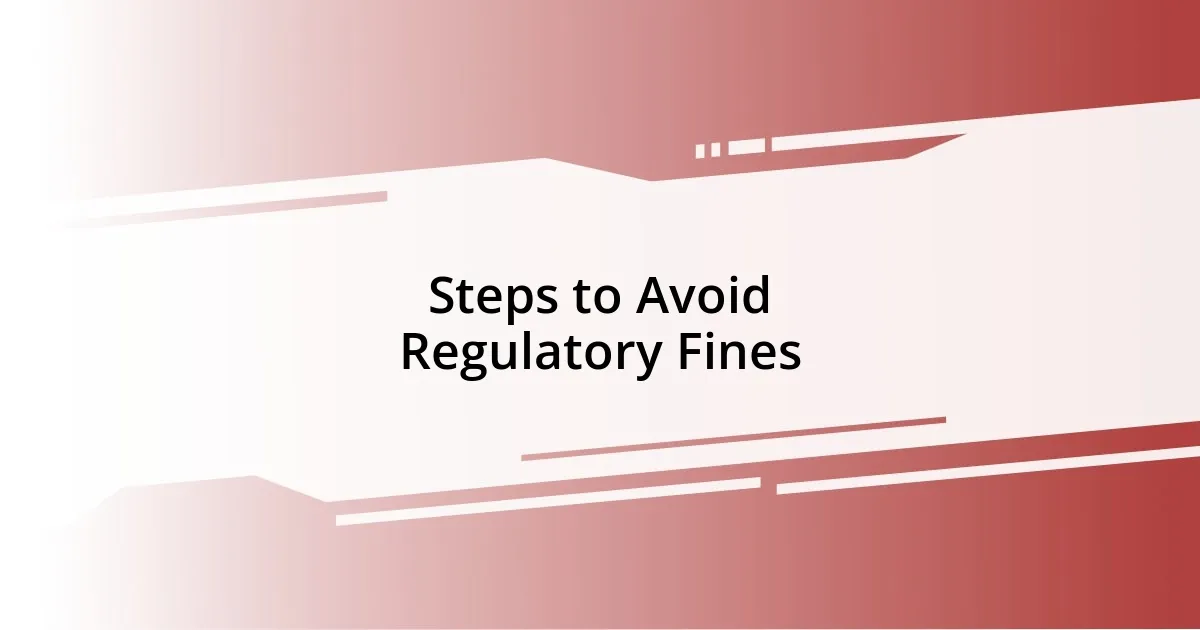
Steps to Avoid Regulatory Fines
To avoid the pitfalls of regulatory fines, proactive measures are essential. One of my top strategies has been establishing a culture of compliance within my team. By sharing regular training sessions and updates on evolving regulations, I’ve fostered an environment where staying informed is a shared responsibility. It’s rewarding to watch my colleagues take ownership of compliance practices, knowing we’re all working together to avoid these costly mistakes.
Here are some steps that have been particularly effective:
- Regular Training: Conduct frequent workshops to ensure every team member understands the regulations affecting our industry.
- Compliance Checklists: Create and distribute checklists that detail key regulatory requirements relevant to our operations.
- Open Communication: Encourage team members to voice concerns or questions about regulations, making it easier to address potential issues before they escalate.
- Routine Audits: Schedule internal audits to identify any lapses in compliance early on and rectify them promptly.
- Document Everything: Maintain thorough records of processes and compliance efforts to provide clear evidence during audits.
On a personal note, I once implemented a compliance workshop after realizing that several team members were unaware of specific industry changes. The relief I felt when they expressed gratitude for the increased clarity was profound, highlighting the importance of open dialogue in mitigating risks. It’s moments like these that reinforce my belief in proactive engagement as a powerful tool against regulatory fines.
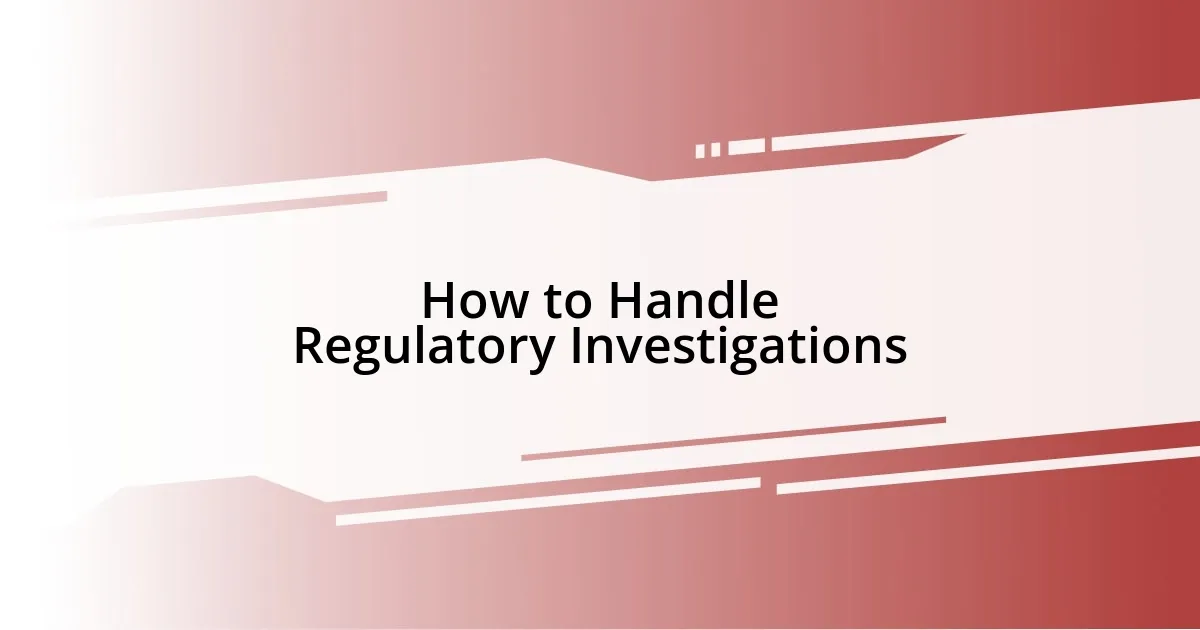
How to Handle Regulatory Investigations
Dealing with regulatory investigations can be daunting, but the way you respond can significantly influence the outcome. I remember a time when our organization faced an unexpected investigation. My first instinct was to gather the team and openly discuss everything we knew. It was crucial to ensure that everyone was on the same page and felt comfortable sharing any insights or concerns. When you foster a transparent atmosphere, it often leads to better cooperation and ultimately smoother investigations.
Another key strategy is to thoroughly review your internal documentation before the regulators come knocking. I learned this the hard way when we had inconsistent records about compliance practices. The stress of not having everything in order was overwhelming, but it pushed me to implement a new system for regular reviews. This not only prepared us for any inquiries but also gave me peace of mind knowing we were ready to present our case clearly and confidently.
Finally, always remember to engage constructively with regulators. During one investigation, I found that maintaining a respectful dialogue turned what could have been a tense situation into a collaborative one. I asked questions to clarify their needs, which helped them understand our perspective too. Could this approach have saved us from more severe penalties? In my experience, absolutely. Building a rapport with regulatory bodies can transform the investigation process into a learning opportunity rather than just a punitive experience.
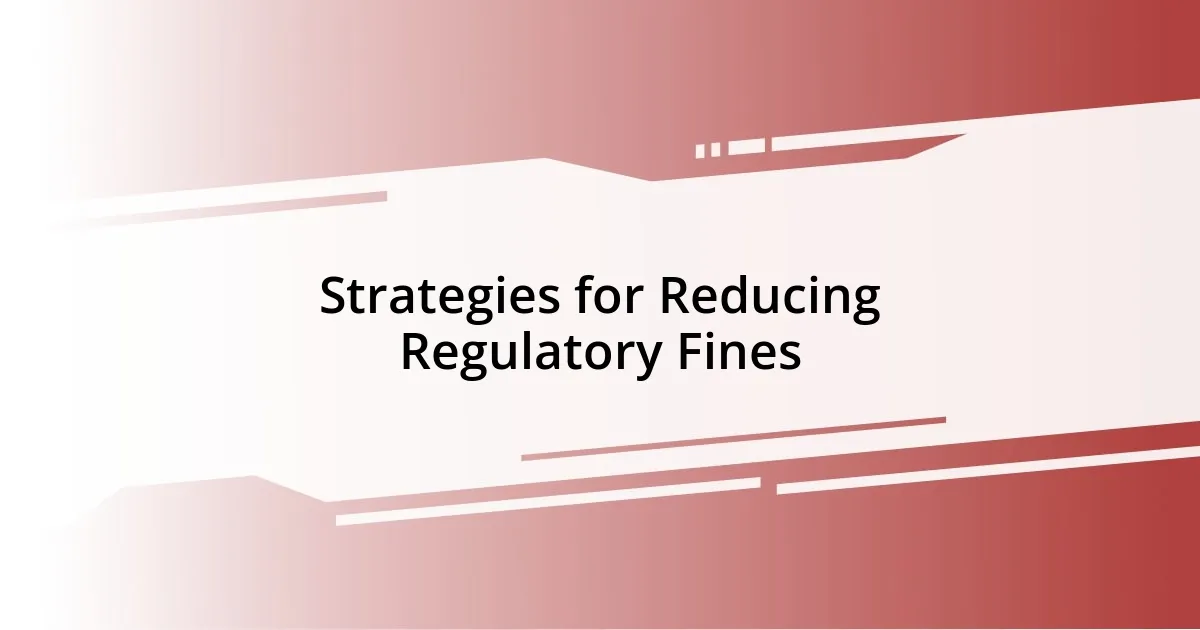
Strategies for Reducing Regulatory Fines
One effective strategy for reducing regulatory fines is to embrace technology for compliance tracking. When I first integrated compliance management software into our operations, I was amazed at the clarity it provided. It automated many aspects, tracking changes in regulations and reminding us of deadlines. The weight lifted off my shoulders when I realized I no longer had to manually sift through endless updates. Isn’t it comforting to know that technology can help us stay ahead of the regulatory curve?
Additionally, fostering a strong relationship with regulatory authorities can work wonders. I recall a conversation with a regulator that unexpectedly turned into a valuable brainstorming session. Instead of feeling adversarial, we discussed best practices and openly shared our challenges. This not only enhanced our understanding but also received positive feedback from the regulators on our willingness to learn and adapt. Doesn’t it feel great when a relationship transforms from one of fear to one of partnership?
Lastly, learning from past errors plays a crucial role in reducing future fines. Early in my career, our team faced a fine due to a misunderstanding of a regulatory change. It hit hard—not just financially but emotionally. However, that experience became a turning point. I implemented a ‘lessons learned’ forum where we gather to dissect previous mistakes and figure out how to prevent them in the future. This practice has proven invaluable, turning those challenging moments into a powerful tool for growth. How many times do we wish we could turn back time and avoid those missteps? Instead, we can choose to make them meaningful stepping stones.

Lessons Learned from Personal Experience
One lesson that stands out from my experience is the importance of staying proactive rather than reactive. There was a time when I hoped we could coast along after overcoming a few hurdles. I quickly learned that complacency was a dangerous mindset. By implementing regular compliance audits, we not only identified potential pitfalls before they arose but also cultivated a culture of vigilance. Have you ever been caught off guard and realized too late that a little preparation could have saved you?
I also discovered that the power of humility cannot be overstated in regulatory matters. I remember attending a conference where a colleague openly shared their company’s missteps with regulators. At first, I was taken aback, thinking they’d be judged harshly. Instead, the room buzzed with respect for their honesty and willingness to learn. It reinforced my belief that showing vulnerability can open doors to constructive dialogues, helping others understand your journey. How enlightening is it to see that admitting our mistakes can turn us into stronger players in the game?
Another profound insight for me was the significance of building a supportive team environment. I recall a moment when my team faced a particularly stressful compliance deadline. Instead of crumbling under pressure, we rallied together, sharing our strengths and supporting one another. It taught me that when everyone feels valued and encouraged, the results can be transformative. Have you noticed how teamwork can completely shift the energy in a challenging situation? In my experience, this collaboration often leads to innovative solutions that none of us could have devised alone.

Tips for Future Compliance Success
When it comes to ensuring future compliance success, I’ve learned that ongoing employee training is vital. A few years back, I implemented a quarterly training program focused on regulatory updates and best practices. The transformation was remarkable; team members felt empowered and informed, making fewer mistakes. Isn’t it amazing how knowledge can lead to greater confidence in handling compliance?
Another tip I find valuable is the significance of creating a compliance checklist tailored to your specific industry. I vividly remember the moment we created a detailed checklist for our operations. It became our go-to reference, simplifying complex regulations into manageable steps. This approach reduced my anxiety significantly during audits. Who wouldn’t feel relief knowing exactly what needs to be done?
Lastly, embracing an open-door policy encourages dialogue about compliance. I once had a junior employee approach me with a concern about a regulation that didn’t seem clear. Initially, I was busy, but I made time to discuss it with them. That conversation not only led us to clarify our approach but also fostered a culture of openness. Isn’t it empowering to realize that every voice counts in creating a compliant environment?












